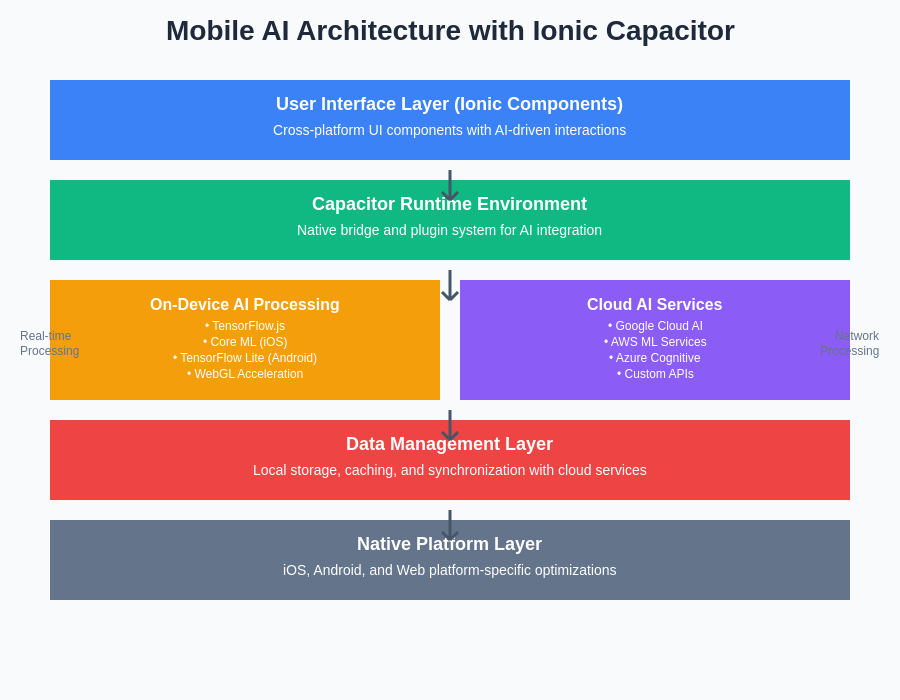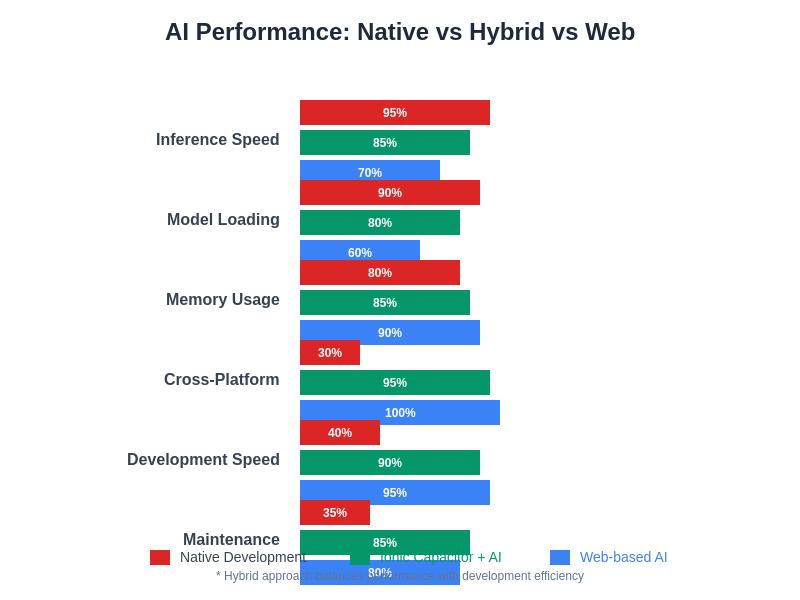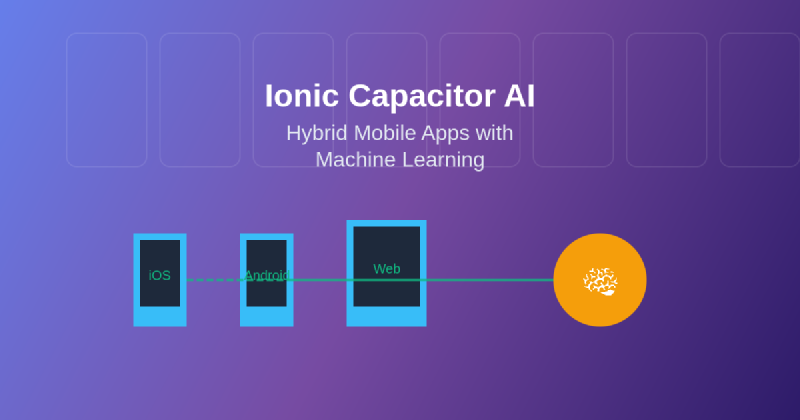The convergence of hybrid mobile development with artificial intelligence has opened unprecedented opportunities for creating sophisticated cross-platform applications that deliver native-level performance while leveraging the power of machine learning. Ionic Capacitor, as a modern cross-platform runtime, provides developers with the perfect foundation for integrating AI capabilities into hybrid mobile applications, enabling the creation of intelligent apps that can run seamlessly across iOS, Android, and web platforms with a single codebase.
Stay updated with the latest AI mobile development trends to understand how machine learning is transforming the mobile app landscape. The integration of AI into hybrid mobile applications represents a significant evolution in mobile development, offering developers the ability to create intelligent, context-aware applications that adapt to user behavior and provide personalized experiences across multiple platforms simultaneously.
The Evolution of Hybrid Mobile AI Development
The traditional challenges of mobile development have been fundamentally transformed through the combination of Ionic Capacitor’s cross-platform capabilities and modern AI frameworks. Previously, developers faced the daunting task of maintaining separate codebases for different platforms while also implementing complex machine learning models that required platform-specific optimizations. Ionic Capacitor eliminates these barriers by providing a unified development environment that seamlessly bridges web technologies with native device capabilities, creating an ideal platform for AI-powered mobile applications.
The architectural advantages of Capacitor extend beyond simple code reusability. The framework’s plugin system allows for deep integration with platform-specific AI libraries and services, while its web-based core ensures that complex machine learning computations can be efficiently distributed between client-side processing and cloud-based inference. This hybrid approach enables developers to create applications that balance performance, functionality, and resource utilization while maintaining the flexibility to adapt to different platform requirements and constraints.
Integrating TensorFlow.js with Ionic Capacitor
TensorFlow.js represents one of the most powerful tools for bringing machine learning capabilities to hybrid mobile applications built with Ionic Capacitor. The framework’s JavaScript-native implementation allows for seamless integration with Ionic’s web-based architecture, enabling developers to deploy pre-trained models directly within their applications or implement custom training workflows that leverage device capabilities. This integration provides unprecedented flexibility for creating intelligent mobile applications that can perform complex AI tasks without requiring constant connectivity to external services.
The implementation of TensorFlow.js within Capacitor applications involves careful consideration of performance optimization and resource management. Mobile devices have inherent limitations regarding computational power and memory availability, making it essential to optimize model architectures and implement efficient data processing pipelines. Developers can leverage Capacitor’s native plugins to access device-specific acceleration features such as GPU processing and neural processing units, significantly improving the performance of machine learning operations while maintaining cross-platform compatibility.
Experience advanced AI development with Claude for comprehensive guidance on implementing machine learning solutions in hybrid mobile applications. The combination of expert AI assistance and Ionic Capacitor’s robust framework creates an optimal environment for developing sophisticated mobile AI applications that push the boundaries of what’s possible in cross-platform development.
Implementing On-Device Machine Learning Models
On-device machine learning has become increasingly important for mobile applications that require real-time processing, offline functionality, and enhanced privacy protection. Ionic Capacitor provides excellent support for integrating on-device ML models through its flexible plugin architecture and native bridge capabilities. Developers can implement various types of machine learning models, including image classification, natural language processing, predictive analytics, and computer vision applications, all running directly on the user’s device without requiring external network connectivity.
The process of implementing on-device models involves several critical considerations including model optimization, format conversion, and platform-specific deployment strategies. Capacitor’s ability to interface with native iOS and Android ML frameworks such as Core ML and TensorFlow Lite enables developers to leverage platform-optimized inference engines while maintaining a unified codebase. This approach ensures optimal performance across different devices while providing the flexibility to implement platform-specific optimizations where necessary.

The architectural design of mobile AI applications requires careful balance between functionality, performance, and resource utilization. Modern hybrid applications leverage a multi-tiered approach that combines on-device processing for real-time operations with cloud-based services for complex computations and model updates.
Cloud-Based AI Services Integration
While on-device processing provides excellent performance and privacy benefits, many AI applications require the computational power and sophisticated models available through cloud-based services. Ionic Capacitor excels in integrating with various cloud AI platforms including Google Cloud AI, AWS Machine Learning services, Microsoft Azure Cognitive Services, and specialized AI APIs. This integration enables developers to create applications that seamlessly combine local processing with cloud-based intelligence, providing users with comprehensive AI capabilities regardless of device limitations.
The implementation of cloud-based AI services within Capacitor applications involves sophisticated error handling, offline capability management, and data synchronization strategies. Developers must design applications that gracefully handle network connectivity issues while providing meaningful functionality in offline scenarios. This hybrid approach to AI processing ensures that applications remain responsive and functional across various network conditions while leveraging the full power of cloud-based machine learning services when connectivity is available.
Computer Vision and Image Processing
Computer vision represents one of the most compelling applications of AI in mobile development, and Ionic Capacitor provides excellent support for implementing sophisticated image processing and analysis capabilities. The framework’s camera and media plugins enable seamless integration with device cameras and photo libraries, while its JavaScript-based architecture allows for real-time image processing using libraries such as OpenCV.js and custom TensorFlow models.
The implementation of computer vision features in Capacitor applications can range from simple image filters and enhancement tools to complex object detection, facial recognition, and augmented reality applications. Developers can leverage the framework’s ability to access native camera APIs while processing captured images using web-based ML libraries, creating applications that provide real-time visual intelligence across multiple platforms. This approach enables the creation of applications for diverse use cases including document scanning, product recognition, medical imaging, and industrial inspection.
Natural Language Processing in Mobile Apps
Natural language processing capabilities have become essential for modern mobile applications, enabling features such as intelligent chatbots, sentiment analysis, language translation, and voice-to-text processing. Ionic Capacitor provides excellent support for integrating NLP capabilities through both client-side libraries and cloud-based services, allowing developers to create applications that can understand and respond to natural language input in sophisticated ways.
The implementation of NLP features often involves combining multiple technologies and services to create comprehensive language understanding systems. Capacitor applications can integrate with speech recognition APIs, text analysis services, and custom language models to provide users with intuitive natural language interfaces. The framework’s cross-platform nature ensures that these language processing capabilities work consistently across iOS, Android, and web platforms, providing users with seamless experiences regardless of their chosen device.
Enhance your research capabilities with Perplexity to stay current with the latest developments in mobile NLP and AI technologies. The rapidly evolving landscape of natural language processing requires continuous learning and adaptation to leverage new capabilities and improve application functionality.
Performance Optimization for Mobile AI
Performance optimization represents a critical aspect of mobile AI development, particularly when working with resource-constrained devices and complex machine learning models. Ionic Capacitor provides several strategies for optimizing AI performance including efficient memory management, background processing capabilities, and integration with platform-specific optimization frameworks. Developers must carefully balance model complexity, inference speed, and resource utilization to create applications that provide excellent user experiences across diverse device configurations.
The optimization process involves multiple layers including model architecture selection, data preprocessing optimization, and implementation of efficient caching strategies. Capacitor’s plugin system enables developers to implement custom optimization solutions that leverage platform-specific capabilities such as neural processing units, GPU acceleration, and optimized mathematical libraries. This multi-faceted approach to performance optimization ensures that AI-powered applications can deliver responsive, efficient operation while maintaining cross-platform compatibility.

Performance metrics demonstrate the significant impact of optimization strategies on mobile AI applications. Proper implementation of caching, model optimization, and platform-specific acceleration can dramatically improve inference speed and reduce resource consumption.
Building Intelligent User Interfaces
The integration of AI capabilities into mobile applications enables the creation of intelligent user interfaces that adapt to user behavior, provide predictive functionality, and offer personalized experiences. Ionic Capacitor’s component-based architecture and reactive data binding capabilities make it ideal for implementing dynamic interfaces that respond to AI-driven insights and predictions. These intelligent interfaces can significantly enhance user engagement and application effectiveness by providing contextually relevant information and functionality.
The development of AI-driven interfaces involves implementing sophisticated state management systems that can handle complex data flows between AI models, user interactions, and application logic. Capacitor’s integration with modern web frameworks enables developers to create responsive interfaces that seamlessly incorporate AI functionality while maintaining excellent performance and user experience standards. This approach allows for the creation of applications that feel naturally intelligent and intuitive to users.
Security and Privacy Considerations
Security and privacy represent paramount concerns when developing AI-powered mobile applications, particularly those that process sensitive user data or implement biometric authentication systems. Ionic Capacitor provides robust security features including secure storage capabilities, encrypted communication protocols, and integration with platform-specific security frameworks. Developers must implement comprehensive security strategies that protect both user data and AI models from potential threats and unauthorized access.
The implementation of privacy-preserving AI techniques such as federated learning, differential privacy, and on-device processing becomes crucial for applications that handle sensitive information. Capacitor’s ability to implement sophisticated encryption and data protection mechanisms ensures that AI applications can maintain user trust while providing powerful functionality. This balance between capability and privacy protection is essential for creating applications that meet modern regulatory requirements and user expectations.
Cross-Platform Model Deployment
One of the most significant advantages of using Ionic Capacitor for AI development is the ability to deploy machine learning models consistently across multiple platforms while maintaining optimal performance on each target environment. The framework’s abstraction layer enables developers to implement platform-agnostic AI functionality while still accessing platform-specific optimization features when necessary. This approach significantly reduces development complexity and maintenance overhead while ensuring consistent user experiences across different devices and operating systems.
The deployment process involves careful consideration of model formats, optimization strategies, and platform-specific requirements. Capacitor’s plugin architecture enables seamless integration with different ML frameworks and deployment targets, allowing developers to choose the most appropriate approach for their specific use cases. Whether deploying lightweight models for edge computing scenarios or implementing hybrid approaches that combine local and cloud-based processing, Capacitor provides the flexibility and tools necessary for successful cross-platform AI deployment.
Future Trends and Opportunities
The future of mobile AI development with Ionic Capacitor promises exciting opportunities for innovation and capability expansion. Emerging technologies such as edge AI accelerators, federated learning systems, and advanced neural architecture search are becoming increasingly accessible through improved frameworks and tools. Capacitor’s commitment to staying current with web standards and mobile platform evolution ensures that developers will continue to have access to cutting-edge AI capabilities as they become available.
The evolution toward more sophisticated AI applications will likely involve increased integration with Internet of Things devices, augmented reality systems, and advanced sensor technologies. Capacitor’s flexible architecture positions it well to support these emerging use cases while maintaining the simplicity and efficiency that make it attractive for cross-platform development. Developers who invest in learning and implementing AI capabilities within Capacitor applications will be well-positioned to take advantage of future technological developments and market opportunities.
Development Best Practices and Recommendations
Successful implementation of AI capabilities in Ionic Capacitor applications requires adherence to established best practices and careful consideration of architectural decisions. Developers should prioritize modular design patterns that separate AI logic from user interface components, implement comprehensive error handling and fallback mechanisms, and design applications with scalability and maintainability in mind. These practices ensure that AI-powered applications can evolve and adapt to changing requirements and technological advances.
The development process should also include thorough testing strategies that validate AI functionality across different devices, network conditions, and usage scenarios. Capacitor’s testing capabilities enable comprehensive validation of both functional requirements and performance characteristics, ensuring that applications meet quality standards before deployment. Additionally, developers should implement monitoring and analytics systems that provide insights into AI performance and user interaction patterns, enabling continuous improvement and optimization of application functionality.
The integration of artificial intelligence with Ionic Capacitor represents a transformative approach to mobile development that combines the efficiency of cross-platform development with the power of modern machine learning. As AI technologies continue to evolve and mobile devices become increasingly capable, the opportunities for creating innovative, intelligent applications will continue to expand. Developers who master the integration of AI capabilities within Capacitor applications will be well-positioned to create the next generation of mobile experiences that seamlessly blend human intuition with artificial intelligence.
Disclaimer
This article is for informational purposes only and does not constitute professional advice. The technologies and techniques discussed are rapidly evolving, and readers should conduct thorough research and testing before implementing AI capabilities in production applications. Performance results may vary depending on specific use cases, device capabilities, and implementation details. Always consider security, privacy, and regulatory requirements when developing AI-powered mobile applications.
